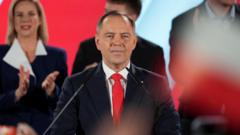The U.S. has enacted severe tariffs on Chinese goods, escalating tensions with China and leading to reciprocal tariffs from various countries, which resulted in a significant market downturn, showcasing the fragility of the global economy.**
Global Markets Rattle as U.S. Tariffs Trigger Retaliation Waves**

Global Markets Rattle as U.S. Tariffs Trigger Retaliation Waves**
Tariffs imposed by the Trump administration have sparked a fierce backlash across Asia and Europe, leading to fears of a looming global recession.**
---
April 9, 2025, 6:30 a.m. ET
President Trump’s administration has taken a dramatic turn in international trade relations, announcing a staggering 104 percent tariff on Chinese imports. This aggressive move, effective shortly after midnight on Wednesday, is reshaping markets worldwide and raising alarms about a potential global economic downturn.
As anticipated, the Chinese government retaliated with its own set of tariffs set to take effect at noon today. European leaders have expressed their intention to respond, setting up a backdrop for heightened global tensions. The market's initial reaction has been negative, with stock indices tumbling and bond yields spiking. Traditional safe-haven assets, like U.S. government bonds, have seen a sell-off, signaling investor anxiety regarding the potential fallout.
Asian markets have continued to decline following the announcement, with particular concern now resting on how this will impact economies reliant on exports to the U.S. The S&P 500 is teetering on the brink of bear market territory, with analysts warning that fears of disrupted global supply chains could fuel inflation and stifle growth.
In response to the tariffs, numerous governments, particularly in Asia, are scrambling to negotiate concessions to protect their industries. Taiwan and Vietnam, for instance, are actively seeking to engage with the Trump administration in hopes of averting further tariffs. Meanwhile, India’s pharmaceutical sector, which has thus far been insulated from the tariffs, is now bracing for potential inclusion, stirring unrest among high-performing exporters.
The Chinese government condemned the U.S. tariffs, framing them as acts of "protectionism" and reaffirming its commitment to retaliate. In an official statement, Beijing emphasized the need to safeguard its economic interests while navigating through these turbulent waters.
International relations are shifting as countries weigh their positions carefully. Reports indicate that leaders from various nations, including South Korea, Canada, and several EU member states, are seeking dialogue with U.S. officials to negotiate terms. However, the effectiveness of these diplomatic efforts remains uncertain as the rhetoric around trade intensifies.
As uncertainty looms, concerns grow over a potential decoupling of the global economy, echoing fears of the fallout from the ongoing conflicts. Analysts predict the situation could escalate, igniting more significant economic repercussions not just for the countries involved, but for the global market as a whole.
With the economic implications still unfolding, market watchers and economists will be closely monitoring developments over the coming days, particularly as the European Union prepares to vote on its proposed countermeasures against U.S. tariffs.
April 9, 2025, 6:30 a.m. ET
President Trump’s administration has taken a dramatic turn in international trade relations, announcing a staggering 104 percent tariff on Chinese imports. This aggressive move, effective shortly after midnight on Wednesday, is reshaping markets worldwide and raising alarms about a potential global economic downturn.
As anticipated, the Chinese government retaliated with its own set of tariffs set to take effect at noon today. European leaders have expressed their intention to respond, setting up a backdrop for heightened global tensions. The market's initial reaction has been negative, with stock indices tumbling and bond yields spiking. Traditional safe-haven assets, like U.S. government bonds, have seen a sell-off, signaling investor anxiety regarding the potential fallout.
Asian markets have continued to decline following the announcement, with particular concern now resting on how this will impact economies reliant on exports to the U.S. The S&P 500 is teetering on the brink of bear market territory, with analysts warning that fears of disrupted global supply chains could fuel inflation and stifle growth.
In response to the tariffs, numerous governments, particularly in Asia, are scrambling to negotiate concessions to protect their industries. Taiwan and Vietnam, for instance, are actively seeking to engage with the Trump administration in hopes of averting further tariffs. Meanwhile, India’s pharmaceutical sector, which has thus far been insulated from the tariffs, is now bracing for potential inclusion, stirring unrest among high-performing exporters.
The Chinese government condemned the U.S. tariffs, framing them as acts of "protectionism" and reaffirming its commitment to retaliate. In an official statement, Beijing emphasized the need to safeguard its economic interests while navigating through these turbulent waters.
International relations are shifting as countries weigh their positions carefully. Reports indicate that leaders from various nations, including South Korea, Canada, and several EU member states, are seeking dialogue with U.S. officials to negotiate terms. However, the effectiveness of these diplomatic efforts remains uncertain as the rhetoric around trade intensifies.
As uncertainty looms, concerns grow over a potential decoupling of the global economy, echoing fears of the fallout from the ongoing conflicts. Analysts predict the situation could escalate, igniting more significant economic repercussions not just for the countries involved, but for the global market as a whole.
With the economic implications still unfolding, market watchers and economists will be closely monitoring developments over the coming days, particularly as the European Union prepares to vote on its proposed countermeasures against U.S. tariffs.




















